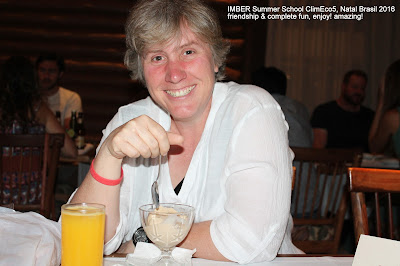It is always a pleasure to talk to people who think out of the box and Beth is indeed one of those! These days, thinking out of the box may just well mean to do things in the ways we did before, seeing the whole picture and not only the parts. Beth talks about this and much more here, but before we get there, let’s just remind you about who Beth Fulton is, a name very familiar for those studying fisheries. Beth has a PhD in ecomathematics from the University of Tasmania and is a leading marine ecosystem modeller with a background in marine ecology, mathematics and scientific programming. She has been leading the CSIRO ecosystem modelling efforts in Australia for the past 15 years. Her science focus is on marine natural resource management, conservation and ecosystems.
Beth’s team focuses on the development of programs that model marine ecosystem models (e.g. Atlantis, InVitro and CORSA). In particular, such modelling software give equal attention to biophysical and human components of marine ecosystems. These models allow users to explore the impacts and management of the myriad pressures on marine and coastal environments. The approach underpins CSIRO’s research into managing potentially competing uses of Australia’s marine environments and adaptation to global change and is currently used up by researchers and management bodies in 26 countries around the world.
In August (2016) during the IMBER ClimEco5 Summer School in Natal, Brazil, we had a chance to have a quick chat with her. Check it out!
FEME: There is still some resistance from scientists in relation to the modeling of nature. For instance, some of them believe that is impossible to model nature with all its complexity. What is your view on that?
Beth Fulton: I would say that everybody models nature already, they just do it in their heads. And so, by getting the models out into mathematics or onto a piece of paper you at least have all of the assumptions clear, so that everybody can talk around it. You are not assuming that people know the same things that you do, because people will make decisions regardless of the models or not. So, it is better to have that information out there to make clear what we do and what we don’t know and to help understanding than to just give up and keep it all in their heads and keep it messy.
FEME: In your opinion, how reliable are IPCC scenarios?
Beth Fulton: Of course there is going to be things that don’t work exactly like in the model. It is just a model! But the basic fundamental principles of the way that the atmosphere works and what that means for the oceans have been known for over a hundred years. They got the same basic answers with pencils and papers a hundred years ago. The finer details of today around specific locations are why we continue to need to refine this work. But they (IPCC scenarios) are basically reliable for the general pattern of change. We can’t wait to the changes to happen to see what it is before we can react, because of the long- term timeframes. The changes we are making today will already influence the next a thousand to a million years of the ocean and the world, so we need to act now. It is like when you save in a bank account, the earlier you save the more difference that you make. That is why you need to just say we don’t know everything perfectly, we might need to change a few things as we go along, but the basic reliability is pretty strong for general patterns.
FEME: What changes would you like to see in the scientific community for the future?
Beth Fulton: That one I would like to see across all academia: an embracing of the idea that we are all equal, that no group is better than any other group, and that we share that information and understanding together. As we have understood more and more, we have become very constraint into a one little bit of science, which can be so different from place to place. There are thousands of different kinds of science. So, I would like the renaissance idea of all science together across the disciplines. So people have that big broad view again, instead of getting stuck there in their one little bit.
Latest publications:



Do you need personal loan?
ReplyDeleteLoan for your home improvements,
Mortgage loan,
Debt consolidation loan,
Commercial loan,
Education loan,
Car loan,
Loan for assets.
financialserviceoffer876@gmail.com Whatsapp +918929509036
Thank you for sharing this.
ReplyDeleteSingapore being a premier education hub offers students a very unique learning atmosphere and experience as they receive a very perfect blend of educational, social and cultural mix from the world.
Singapore Study Visa Consultants in Chandigarh